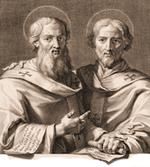Catholic Activity: St. Philip's Suggestions for Idleness and Learning Patience
A wonderful story to tell children on St. Philip Neri's Suggestion for People Who Have Nothing To Do, How He Learned Patience and How He Did Not Trust Himself.
DIRECTIONS
As a little boy St. Philip Neri was called Pippo buono — good little Philip — because he was good and merry and gentle, and he grew up to be a very cheerful saint. When he was in his teens, his father sent him to live with an uncle who had an estate and needed an heir, but something happened to Philip and he lost all interest in worldly estates and cared only that he was an heir of heaven, so he went off to Rome to discover what God wanted of him. There he prayed and studied and prayed some more, and after a time he began to frequent the public squares, the shops, the schools, sometimes even the banks of Rome, striking up acquaintances, engaging people in conversation, warming their hearts with his friendship. In reality it was the beginning of his special apostolate: the re-evangelizing of Rome. In his customary greeting parents will find the answer to the melancholy moan of many a plaintive child, "There's nothing to do!" St. Philip used to say, "Well, my brothers, when shall we begin to do good?" (And it is exactly the thing for the melancholy: "Do some good.").
By the time he became a priest, he was so advanced in the love of God that he could not say Mass without weeping or being caught up in an ecstasy and spending far more time at it than any sensible person thought fit. Two of the sacristans especially found him offensive and did all in their power to annoy him. Knowing he had a particular aversion to soiled vestments, they chose for him the oldest and most soiled they could find. They would pretend they thought he was not going to say Mass and lock the sacristy door before he arrived. Noticing that he ate only one meal a day, in the sacristy after Mass, and that it consisted only of a couple of rolls and a tiny flask of wine, they were scornful and took it for a parade of austerity. How they tried him! It is good to know it did try him.
One morning at Mass he gazed at the Crucifix and said: "O good Jesus! why is it that Thou dost not hear me? See how long a time I have besought Thee to give me patience! Why is it that Thou hast not heard me, and why is my soul disquieted with thoughts of anger and impatience?" The answer came in his soul: "Dost thou not ask patience of Me, Philip? Behold I will give it thee speedily on this condition: that, if thy heart desire it, thou earn it through these temptations of thine." That is how virtue is earned — by fighting its contrary.
More and more followers flocked to him until he finally formed a group called the Oratorians, the beginning of the foundation of his society. It is from the accounts of his relationship as father and confessor to his spiritual sons and penitents that the most endearing stories of St. Philip come. He had a particular — some thought it merely peculiar — genius for matching particular mortifications and penances to particular souls. Since pride is especially vulnerable before a sense of one's foolishness, St. Philip devised mortifications without end for attacking pride in souls of promise who could bear his heavy-handed humor. Giambattista Salviati, the brother of a cardinal, cousin of Catherine de Medici, the Queen of France, and grandnephew of a pope, was one of the saint's favorite victims. His grandeur did not outshine his obedience, however, and he was seen sweeping the porch in his elegant satin finery and carrying Philip's little dog through the streets in his arms. Father Pietro Consolini was another special victim singled out by Philip for purification and his pride suffered mortal blows each time he was bade to appear abroad with purple taffeta and gold lace around his hat. An especially pious young man asked permission to wear a hair shirt and Philip granted his request with this stipulation: he wear it on the outside. He was known around Rome as "Berto of the hair-shirt."
But if he was demanding of obedience and humility from his sons in religion and his penitents in the confessional, he was ten times as demanding with himself. He went to incredible lengths to prevent people from having a good opinion of him, and it can be truly said that he had no good opinion of himself. He used to say, "Let me get through today, and I shall not fear tomorrow." He used to whisper to Our Lord every day at Mass, "Lord, beware of me today — lest I should betray Thee!"
Activity Source: Saints and Our Children, The by Mary Reed Newland, P.J. Kenedy & Sons, New York; reprinted by TAN Publishers, 1958






